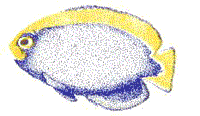-
Browse the Categories to the right, or enter
a topic here

Jellyfish
and Jellyfish Tanks

Acrylic Aquariums, Stands, Canopies and
Filters

Interior Design Projects

Aquarium Reality Video's
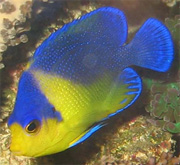
Dwarf and Pygmy Angelfish
Follow us on....





The best and most affordable
Web Host I've ever worked with,...

...and they host this web site.
|
|
|
|
|
|
|
Soft Corals
Soft corals are most often refered to as corals that have a soft or
leathery feel to them. They do not have a 'hard' calcium skeleton but do
utilize small amounts of calcium, called spicules, to give themselves some
rigidity. Their polyps vary in size and some are retractable whereas others
are not.
Soft corals require medium to slightly high water flow. There are two
reasons for this;
Leather corals tend to produce a occasional smooth mucous coating (
which aids in cleansing themselves ) that is shed after one to two weeks
and flow helps them 'slough' this coating.
Soft corals ( Cladiella and Nephthea sps. corals in particular ) are
very sensitive to their surrounding neighbors and when threatened will
retract and produce heavy amounts of mucous for protection. This mucous
if not swept away can encourage bacteria or protozoan infections that can
cause the demise of the coral.
Lighting requirements vary from simple flourescents to strong metal
halide. When adding new soft corals determine what light intensity the
coral was under previously and after an acclimation period slowly increase
the intensity
|
Leather
Coral
|
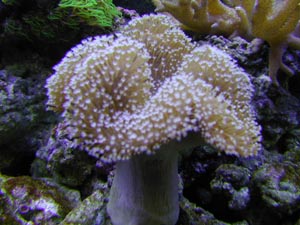
|
Toadstool Leather Coral
Sarcophyton sp.
Central stalk supports a wide oral disk that is covered with small
polyps. Individual polyps vary in size, length, and color. |
|
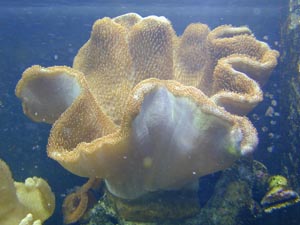
|
Toadstool Leather Coral
Sarcophyton sp.
Central stalk supports a wide oral disk that is covered with small
polyps. Individual polyps vary in size, length, and color. |
|
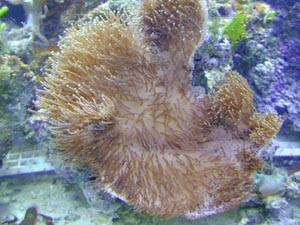
|
Milk, Leather Coral
Sarcophyton sp.
Central stalk barely supports a wide oral disk that is covered with
small polyps. Individual polyps vary in size, length, and color. |
| Finger
Coral |
|
|
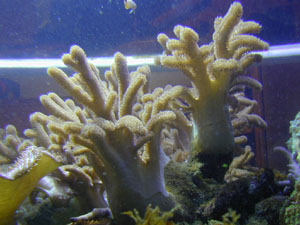
|
Finger Soft Coral
Sinularia sp.
Sturdy base divides outwards to form finger like branches that are
covered with small polyps. Individual polyps vary in size, length, and
color. |
|
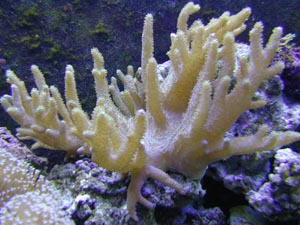
|
Finger Coral
Sinularia sp.
Sturdy base divides outwards to form finger like branches that are
covered with small polyps. Individual polyps vary in size, length, and
color. |
|
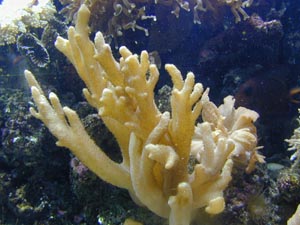
|
Finger Coral
Sinularia sp.
Sturdy base divides outwards to form finger like branches that are
covered with small polyps. Individual polyps vary in size, length, and
color. |
|
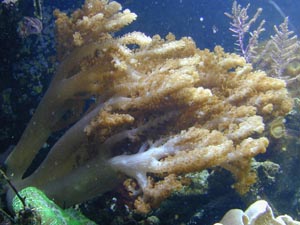
|
Colt, Soft Coral
Cladiella sp.
Fluid like body dividing into branches. Depending on flow the shape
can be short and bushy, or elongated and feathery. Polyps are concentrated
at the ends of the branches. |
|
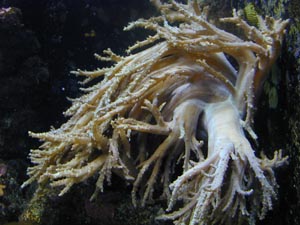
|
Green Soft Coral
Nephthea sp.
Smooth body with elongated branches. Polyps are generally short and
concentrated at the ends of the branches. Famed for its 'green' color,
supposely this coral is no longer easily available due to effects of ElNino
in the wild. |
|
Visit the Aquarium Design home page
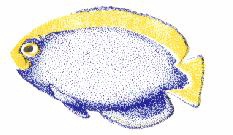
|
|






